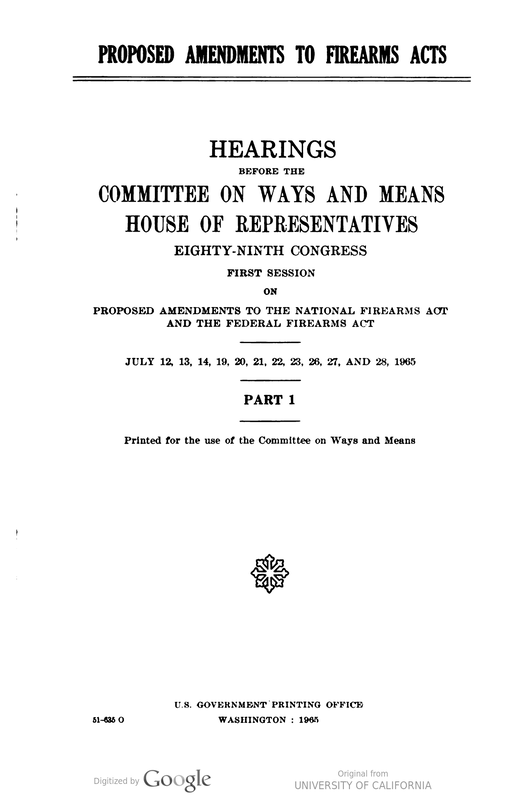|
Proposed Amendments to Firearms Acts. Hearings. House Ways and Means. 89th Congress. July 1965. Part I. In brief, the proposed legislation would do the following: (1) Prohibit mail-order sales of firearms to individuals by limiting firearms shipments in interstate and foreign commerce to shipments between federally licensed importers, manufacturers, and dealers; (2) Prohibit sales by federally licensed importers, manufacturers, and dealers, of all types of firearms to persons under 21 years of age, except that sales of sporting rifles and shotguns could continue to be made to persons over 18 years of age; (3) Curb the flow into the United States of surplus military weapons and other firearms not suitable for sporting purposes; (4) Bring under Federal control interstate shipment and disposition of large caliber weapons such as bazookas and antitank guns, and destructive devices such as grenades, bombs, missiles, and rockets; (5) Increase license fees, registration fees, and occupational taxes under the Federal and National Firearms Acts; and (6) Provide other Federal controls designed to make it feasible for States to control more effectively the traffic in firearms within their own borders under their own police power.[1] Franklin L. Orth, NRA Executive Vice President, criticized "the flood of castoff military weapons that have been dumped in America, particularly crew served weapons...and 'destructive devices,'" but they did oppose the over .50 caliber cut-off and "sporting purposes" as being too vague.[2] "Such things as mortars, bazookas, and rockets are not 'firearms' within the definition contained in the Federal Firearms Act. They can be, and they should be, controlled by amendment to the National Firearms Act in the same manner as machineguns. The National Rifle Association will support such an amendment."[3] "Mr. Chairman, the National Rifle Association fully endorses H.R. 7472 as outlined and urges this committee to give strong consideration to this approach to the control of firearms as a material contribution to the President's war on crime."[4] "Mr. Battin:...when you are talking about bazookas, antitank guns, mortars, and such weapons that cannot be used for sporting purposes, you do not include commercial weapons?" "Mr. Orth: These are not for the sportsmen or used by the sportsmen and they ought to be stopped."[5] The NRA issued a statement at the conclusion of its 1965 annual meeting: "The [NRA] will support [...] legislation to curb the flood of castoff military firearms that have been dumped in America as a result of the adoption of more modern weapons by most countries since World War II."[6] "However, the administrative power [of the NRA] is vested in an executive director and an executive council, and, in keeping with all organizations of considerable longevity, such councils tend to ultraconservatism. Equally, the influx of new administrative talent is kept to a minimum, for the business of the NRA does not require any particularly large number of policymaking personnel. Conflict in running of the NRA is therefore kept to a minimum. External influences which might suggest that the NRA is not the great white hope of the American sportsman are suppressed with whatever means the NRA can bear in particular cases and the one-party system of the NRA tends to preserve status in a changing world. "With this for background, it is not reasonable to suppose that the confidential or secret meetings between representatives or the Secretary of the Treasury, the National Rifle Association, and the Shooting Sports Foundation held Thursday or Wednesday of last week reflected the principle of 'open covenants openly arrived at.'.. These appear to be the facts: "Mr. Franklin Orth [NRA executive vice president] and the representative of the Shooting Sports Foundation were told by the administration spokesmen that they had about 5 minutes to make up their minds." Essentially, they could accept the whole of the bad bills "rammed down their throats" or they could compromise. "It did not take 5 minutes for the SSF and NRA people to decide they would lie down and accept this seeming lesser of evils."[7] [1] Dillon, Douglas. Letter to House Speaker McCormack. March 12, 1965. p. 3 [2] Orth, Franklin L. (Executive Vice President, NRA). Statement on Proposed Amendments to Firearms Acts. July 19, 1965. pp. 183, 185 [3] Orth, Franklin L. (Executive Vice President, NRA). Statement on Proposed Amendments to Firearms Acts. July 19, 1965. p. 193 [4] Orth, Franklin L. (Executive Vice President, NRA). Statement on Proposed Amendments to Firearms Acts. July 19, 1965. p. 194 [5] July 21, 1965. p. 228 [6] Statement of Joseph W. Barr, Under Secretary of the Treasury. July 12, 1965. p. 33 [7] Edwards, William B. pp. 681-682 Comments are closed.
|
Archives
June 2024
CategoriesBlog roll
Clayton E. Cramer Gun Watch Gun Free Zone The War on Guns Commander Zero The View From Out West |

 RSS Feed
RSS Feed